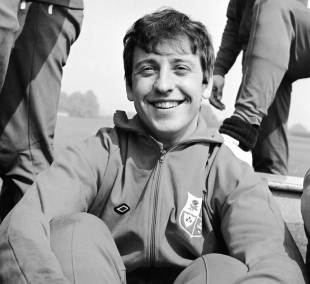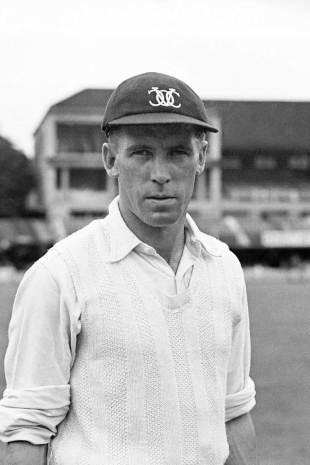|
Scrum Sevens
The one-cap wonders
ESPN Staff
February 27, 2014

Ray 'Chico' Hopkins only wore the red of Wales once - 1970
© Getty Images
Enlarge
In 2012, 22% of the 14,747 players to have run out in international rugby had only won a single cap. Following the death of Denzil Thomas, ESPN looks through some of the memorable one-cap wonders rugby has seen over the years in the latest Scrum Sevens.
Sean McGaugheyRomania 28-22 Scotland, 1984Having shone for Hawick in 1984, McGaughey found himself called up to the Scotland team for their match against Romania in Bucharest. Many of the players who secured the Five Nations Grand Slam that same year had been rested for the trip so he found himself stepping into Jim Calder's shoes for the game. Scotland were consigned to their first defeat to Romania in the blistering heat of Bucharest and McGaughey never played for the national side again. While McGaughey's role in the game is unlikely to write him into Scotland's archives, he did create ructions before the matc when he celebrated his 21st birthday, an occasion he marked by attempting to do 21 pull-ups on a hotel balcony a fair few levels off the ground. "I was just bored," McGaughey said, "And the balconies were staggered so I'd only have fallen into the one below if I slipped. But, John Rutherford, who was in the room below, apparently shat himself, thinking that some Eastern Europeans had got hold of me and were dangling me over the edge!"
Joe AnduranWales 49-14 France, 1910Arrangements for what is now referred to as the first-ever Five Nations match - Wales-France at Swansea on New Year's Day 1910 - were chaotic. When the French assembled in Paris to prepare for the last stages of their journey, it was learnt that Hélier Tilh had been unable to obtain clearance from his military commitments to travel from Bordeaux. The boat train party departed with 14 players, leaving a French official to scour the streets of Paris for a willing 15th man. At length the official stumbled on Joe working in a picture gallery on the Rue la Boétie. Joe thought it was a practical joke when asked to turn out for his country, but he was finally persuaded to gather his kit and join the official on the next train north. Joe's wife wasn't happy by all accounts. She had planned a big family occasion for the New Year's Day holiday. France were hammered 49-14, Joe never played again for his country but did play in the 1913 French Championship Final for his club, SCUF. He was killed in action near Lens in October 1914.
Clive GriffithsWales 27-3 England, 1979When Griffiths finally got the chance to experience Test rugby, he had already spent three games on the trot waiting for his chance from the bench. But after those trio of frustrating experiences, Griffiths came off the bench against England for JPR Williams who had sustained a cut to his calf. "As if someone had slashed him with a Stanley knife," Griffiths later remembered. "I moved then; nearly gave myself a hernia vaulting a barrier to get on the field." Griffiths' entry changed the game as when he came on in the 60th minute it was 7-3 - when he left it was 27-3. He never played for Wales again and switched to rugby league later that year for a then record fee of £27,000.
Martin DonnellyIreland 22-0 England, 1947

Martin 'Squib' Donnelly
© PA Photos
Enlarge
Martin Donnelly was a renowned cricketer who was one of New Zealand's greatest batsmen, albeit one whose career was wrecked by the war in which he served with distinction. In 1946, aged 29, he went to Oxford University, winning Blues at cricket and rugby, and while there he won his one England cap as a centre against Ireland in Dublin in 1947. All of his seven cricket Tests for New Zealand took place in England; his one rugby Test for England was his one international not played there.
Howard MarshallWales 12-11 England, 1893In his only appearance for England he scored a hat-trick of tries against Wales on their first ever visit to Cardiff. But Wales won 12-11 through a late Billy Bancroft penalty goal and he was never again invited to wear the red rose. The game was later remembered as heaters left on over night to prevent the pitch from freezing caused burnt circles to be left on the turf. But Marshall did play on Great Britain's 1891 tour of South Africa two years previous. Lining up at half-back, Marshall was part of the team that beat the hosts 3-0 on August 29 and then 4-0 a week later.
Arnold AlcockEngland 3-3 South Africa, 1906In the early years of the 20th century England's selectors chose their packs on all-round forward ability. Specialism was frowned upon (and didn't become the norm in English sides until Wavell Wakefield's time in the 1920s). For their game against the First Springboks, England's selectors picked Arnold Alcock, a then little known student at Guy's Hospital. It later transpired that there had been a clerical cock-up when Alcock turned up for the game at the Crystal Palace in December 1906. The selectors had meant to choose Lancelot Slocock. Alcock got his cap and went on to serve the Gloucester club as an administrator for many years. But he was never again chosen for England and Slocock duly took his place for the next game.
Ray 'Chico' HopkinsEngland 13-17 Wales, 1970He only played a quarter of a match for Wales, but managed to stamp his name in the nation's rugby lore creating a score for JPR Williams and crossing himself for an important try that turned the match at Twickenham in 1970. Wales were trailing 6-13 when Gareth Edwards limped off and 'Chico' came scampering on as the scrum-half's replacement. His break for JPR to score spurred a remarkable second-half revival that brought Wales a 17-13 win. 'Chico' never again played for Wales, but made another important Test contribution as a replacement when he came on for Edwards at Dunedin the year later when the Lions beat the All Blacks 9-3 in the opening Test of a winning series. © ESPN Sports Media Ltd
|
Live Sports
Communication error please reload the page.
-
Football
-
Cricket
-
Rugby
-
- Days
- Hrs
- Mins
- Secs
F1 - Abu Dhabi GP
Abu Dhabi Grand Prix December 11-131. Max Verstappen ()
2. Valtteri Bottas (Mercedes)
3. Lewis Hamilton (Mercedes)
4. Alexander Albon ()
5. Lando Norris ()
6. Carlos Sainz Jr ()
-
ESPNOtherLive >>
Boxing - Nelson v Wilson; Simmons v Dickinson; Joshua v Gavern (Metro Radio Arena, Newcastle)
Golf - Houston Open
Snooker - China Open
Tennis - Miami Open

